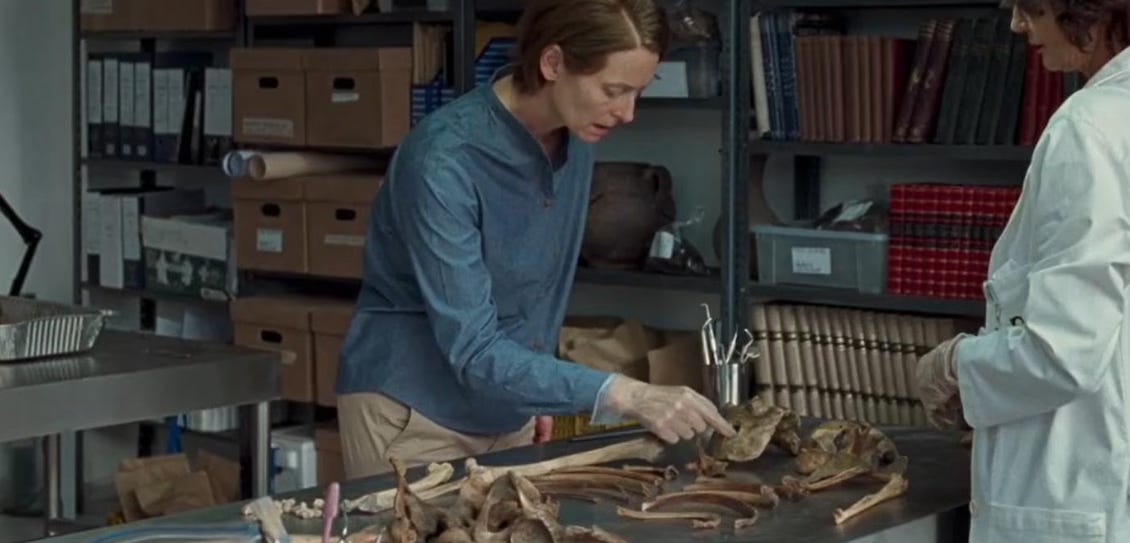Comparisons are odious so I don’t rank the students on my screenwriting course but one of the better ones asked me to watch Apichatpong Weerasethakul’s western language debut “Memoria” to see if I could explain how the film’s narrative structure worked. Weerasethakul, whose film “Uncle Boonmee Who Can Recall His Past Lives” won the Palme d’Or in 2010, is often cited as using unconventional narrative structures but I don’t think that’s fair either to how he actually creates space within his work or to what narrative structure really is. And before you worry that this whole piece is going to be all that sort of thing, I’m going to spoil my own ending by saying I didn’t love “Memoria” for the same reasons I don’t love Ridley Scott’s “Prometheus” and yes, this is going to be all about aliens again.
Ahh spoilers. A favourite bugbear of mine. Anyone who’s endured my screenwriting course (which is 12 times longer than “Memoria”, often just as enigmatic and sadly doesn’t feature Tilda Swinton) will know my argument that spoilers are not a thing.
You can’t spoil a movie by telling someone how the plot resolves. If all a story did was deliver a plot we would never need more than the summaries on wikipedia. If all a story did was to contextualise a series of events so as to give them a meaning we would never need to watch a film twice. If spoilers are real why are cinemas cluttered with remakes?
If revealing the ending made it pointless to watch the film, cinema would just be bad conceptual art, where experiencing the actual realisation of the work adds nothing to the power of the idea behind it. What stories do that is so beguiling is to present a series of events in such a way as to enable us to give them a more resonant meaning for ourselves. A good story is not to watch a magic trick, but to be part of one.
In this, the narrative of “Memoria” functions just the same as any other. It presents a series of events and invites us to ask questions about what those events in this order mean. It also guides us towards the questions Weerasethakul is most interested in us asking and nudges us towards his preferred answers in precisely the same way any other story does. What’s challenging for an audience used to western movies is not how the narrative functions but how willing Weerasethakul is to keep questions unanswered, how happy he is to make us ask questions that have no answer. Mostly this isn’t done through the events of the narrative but by his choices of framing and pacing. “Memoria” exists as a series of wide shots and edits are rare. This is a contrast to the more common style where shot selection, lighting and colour tells the eye where to look and demands it sees what it’s supposed to, whilst regular edits propel you forward, reassuring you that you’ve understood the right meaning. In this style filmmaking is usually a game of reassurance that clarity is either with us or fast approaching. By contrast Weerasethakul often refuses to resolve shots, you watch someone watching someone else sleep and you ask why am I watching this and then you’re not watching that anymore and no real answer has been given. It makes you feel uneasy, which, in a story about a woman plagued by a sound only she can hear, is precisely the aim. The feeling of unansweredness nags at you like tinnitus.
Ridley Scott’s “Alien” employs similar tricks to make you feel uneasy. That film starts with a series of ahuman wide shots as the mechanised life support system revives the crew. It also plays out at a slow pace where often the most pressing question is simply “what’s going on?” As “Alien” progresses this unease resolves into the more straightforward emotion of fear. There is still a lot of blank space for the audience to read but once the creature is stalking its prey we do at least have one overwhelming fact to contend with.
“Memoria” resists building anything. Much of what feels unconventional in the narrative is a willingness to dismantle facts that had previously been offered. Jessica’s bedridden sister Karen recovers and seems barely aware how sick she’d been. When Hernán, the musician who’d helped Jessica recreate the mysterious sound disappears, no one remembers him. Then, just as if this untrustworthy set of events had actually been an investigation leading to a suspect, Jessica happens to meet a man, also called Hernán who seems able to explain her situation. Again this feels like a bold narrative choice because we are used to stories that claim logical causality - but that is always a trick, even if it’s one we always fall for.
For the audience the story reassures us that a certain action leads to a certain outcome which triggers another action and so on until she takes off her glasses and they kiss beneath a clock (or until she climbs into her space suit and opens up the airlock into the vacuum of space).
But these steps of causality have been built by authors specifically because that’s what tricks us into feeling satisfied that their ending has meaning, that it makes sense. We often pick at the bits of stories that don’t convince us as if these were the weak points, as if the art of storytelling was the same as building a watertight case in court. But stories aren’t about proving how something happened. All stories take liberties with the knots of causality which connect their start to their end, most just attempt to hide this. By refusing to tell the lie that his fictional events are strung together by cause and effect Weerasethakul is not redefining narrative, just exposing its true nature - it’s a contrivance that forces us to make meaning.
This is also the real power of Scott’s original “Alien”. A world is created in our peripheral vision, in our heads. There are details of how the creature might have come to be but the barest attempt to explore these is hijacked by the threat of the monster, a threat somehow multiplied in the gaps between what scant details we’d gleaned. The original film sucks you in by leaving so many questions unanswered. Here is the original sin of Scott’s 2012’s prequel “Prometheus”, a film intended to clearly answer all the questions posed by “Alien” as if answering questions and making things make sense was anything like what a story should be doing.
Oddly, for a film that so delights in denying the answers we might normally expect, “Memoria” commits the same sin when Weerasethakul eventually reveals the mysterious boom that haunts Jessica is a recovered memory of the firing of the intergalactic engines of a primordial space craft. I grant this revelation is presented with a characteristic degree of enigma and it is only elliptically implied that this space craft is what brought human life to this planet. The short sequence of images that follow it add no further coherence and so work to someway buttress the film’s sense of itself as being open to interpretation but honestly, it all feels a bit desperate. Having just clearly demonstrated that our central unknowable sound was created by a fairly banal cgi space craft, this final attempt to return to making no sense ironically feels like the art house mirror of bad expositional dialogue explaining the plot.
In both “Prometheus” and “Memoria” the answer is some version of “aliens made us” an answer that deflates mystery yet leaves us without anything like a hard truth. Which is a fancy way of saying it’s all just a bit silly. At least that’s all I was able to create for myself when I watched both films, though I do accept that if a story is a trick you play on yourself, if that misfires the first person you should blame is yourself.
The last few places are available on my screenwriting course which starts again on March 27th in London and on zoom. Across 9 weeks I’ll inspire you, support you, demystify decades of screenwriting advice and give you a series of tools that’ll help you get to the heart of your own story. For more information and booking click here.







Insightful as always. I must say, I do like leaving "a lot of blank space" for the audience in my screenplays, but that's mostly because I'm not good (yet) at writing dialogue. :)
As a grateful attendee of your screenwriting course, I can confirm that the course cuts through a lot of the noise around writing for the screen - the loud shouty American rules-based order through to the deafening inner voice of over-intellectualised European observations one should consider - to focus on our own individual voice. You manage to do that because you care.